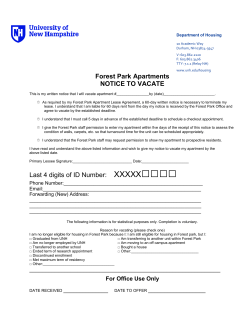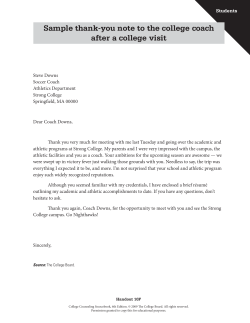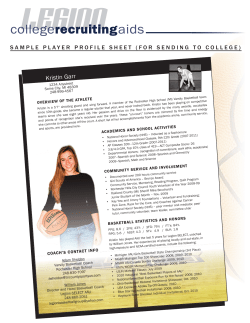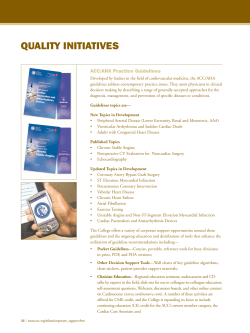
Tim Duncan In The NBA Tim Duncan Personally
Tim Duncan In The NBA Tim Duncan Personally 2003 USA Basketball Men's Senior National Team He and wife, Amy, were married in the summer of 2001 All-NBA First Team 2003 NBA Finals MVP 2003 Two-time Most Valuable Player (2001-02 and 200203) Just the second player in NBA history to be named to both an All-NBA Team and an All-Defensive Team in each of his first five seasons (David Robinson was the first and he earned the honors in each of his first seven seasons) Has been named to the All-NBA First Team all five seasons, the first player since Larry Bird (seventh in NBA history) to be named All-NBA First Team in each of his first four seasons Has earned a spot on the All-Defensive First Team each of the last five seasons after being named to the All-Defensive Second Team as a rookie in '97-98 Named the 1999 Finals MVP Won the 1998 Rookie of the Year Named co-MVP of the 2000 All-Star Game Been named an All-Star five straight seasons (no game was held in 1999) Ranks seventh among active players in playoff career scoring average with 23.9 ppg Played for the USA Team in the 1999 Americas Qualifying Tournament in San Juan, Puerto Rico, was selected to play for the U.S. Team in the 2000 Olympics but had to withdraw due to a knee injury 18 They created the Tim Duncan Foundation in November of 2001. Amy serves as the Executive Vice President of the organization which is setup to serve “the areas of health awareness and research, education and youth sports and recreation” in San Antonio, Winston-Salem and the U.S. Virgin Islands. In 2003, he started the Tim Duncan Foundation Charity Golf Classic at the La Cantera Palmer Course in San Antonio. Received his degree in psychology from Wake Forest. Didn’t play organized basketball until ninth grade, concentrated on swimming as a youngster - at one point was a top U.S. competitor in his age group in the 400 freestyle before his local pool was destroyed by Hurricane Hugo in 1989. Known for wearing his practice shorts backwards, a trend he started while at Wake. Has two sisters, Cheryl and Tricia. Tricia was a member of the Virgin Islands swim team in the 1988 Olympics. Has a large knife collection which includes a three-foot samurai sword. Admits to being afraid of heights. Josh Howard A first-round pick in the 2003 NBA Draft by the Dallas Mavericks The first unanimous ACC Player of the Year selection since 1975 A 2003 consensus first team All-American Named 2003 National Player of the Year by three sources One of just five players in the history of the ACC to accumulate 1,000 points, 500 rebounds, 200 assists, 200 steals and 100 blocked shots Led Wake Forest to the outright ACC regular season title for the first time since 1961 Graduated from Wake Forest in the spring of 2003 Josh Howard of the Dallas Mavericks (left) throws out the first pitch at a Texas Rangers game this past summer. Darius Songaila Sacramento Kings Rodney Rogers New Jersey Nets 19 In the 2002 Fiske Guide to Colleges, Wake Forest receives high ratings for academics, faculty accessibility, use of technology, and quality of life. The guide does not rank schools, but instead, presents university-provided statistics and information along with quotes from student surveys. “I still haven’t figured out when professors do their research - all are published authors and research professors, yet they are always in their offices, willing to help or simply chat with students,” one Wake Forest student wrote. 20 Wake Forest University is among a small, elite group of American colleges and universities recognized for their outstanding academic quality. In this group, some schools offer intimate classes taught by full-time faculty -- not graduate assistants; an oncampus undergraduate enrollment of 4,000 or less; need-blind admissions; big-time athletic programs; and supportive alumni networks. Some schools offer joint research projects between undergraduate students and faculty, nationally-ranked graduate programs and worldwide study-abroad programs. Only Wake Forest brings together all of these qualities to offer a liberal arts education that is greater than the sum of its parts. Steeped in a rich history and tradition, Wake Forest is a private university with two campuses in Winston-Salem. The Reynolda Campus is home to the undergraduate College, the Calloway School of Business and Accountancy, the Graduate School of Arts and Sciences, the School of Law, the Babcock Graduate School of Management and the Divinity School. The Bowman Gray Campus is home to the Wake Forest University School of Medicine. A leader among American educational institutions, Wake Forest has annually received recognition from U.S. News & World Report as one of the top 30 schools in the nation. Barron’s Guide to the Most Competitive Schools has also ranked Wake Forest among the nation’s 52 best public and private universities, one of just nine in the South. The Princeton Review lauds Wake Forest for excellence in academics and high student quality of life. The Kenneth D. Miller Center opened to provide academic services for student-athletes. It also features a state-of-the-art fitness center open to the entire Reynolda Campus community, with average use by over 500 students and faculty per day. The 65,000square-foot Miller Center significantly expanded space for athletic academic services and for the student-athlete community outreach program, CHAMPS/Life Skills. The Dave Budd Gymnasium, within the Miller Center, is a fabulous practice facility for the men’s and women’s basketball teams. Reynolda House, Museum of American Art, became an affiliate of Wake Forest University. Reynolda House was originally built as the early 20th century home of R. J. Reynolds, founder of R. J. Reynolds Tobacco Co., and his wife, Katharine Smith Reynolds. It is now home to a collection of American art dating from the mid18th century that includes works by many of the nation’s most distinguished artists, such as Albert Bierstadt, Mary Cassatt, Frederic E. Church, John Singleton Copley, Stuart Davis, Georgia O’Keeffe, Jacob Lawrence, Gilbert Stuart and Grant Wood. The collection has been described by preeminent art scholar John Wilmerding, of Princeton University, as the finest concentration of American art in a public collection south of Washington (D.C.). The Calloway School of Business and Accountancy began construction on a project to add 50,000 square feet to Calloway Hall. The three-story project opened in the fall of 2003 and is named after the F.M. Kirby Foundation, which donated $5 million for the addition. It includes classroom and office space, and breakout space for group meetings, as well as an entrepreneurial incubator -- a special center designed for entrepreneurial business study. The expansion will allow the Calloway School, Wake Forest’s largest undergraduate program, to exist in its own space for the first time. In the 2002-03 year, Wake Forest established a center for vocational exploration for undergraduate students. The University received a $1.9 million grant from the Lilly Endowment of Indianapolis to support the opening of the Pro Humanitate Center, named for the University’s motto, which means for the good of humanity. The Pro Humanitate Center offers a variety of programs encouraging students to explore the nature of vocation as they consider possible careers. Seminars and workshops stress the importance of values, spirituality and traditions in professional life. Students find outstanding academic programs, sophisticated computing and networking technology, intimate class settings, a strong sense of community and active social life. Only at Wake Forest can they find it all. 21 Much of the work it takes to become a successful student-athlete at Wake Forest doesn’t happen on the court, the library or even the classroom. In order to become the best they can possibly be, the athlete’s journey starts in the weight room. Ethan Reeve is in his third year as the head strength and conditioning coach at Wake Forest. He has implemented a program that challenges every player to the utmost. It is his goal to help each player maximize his or her potential while adding speed, strength and size. Under the direction of Reeve, the Wake Forest strength and conditioning program has adopted a new, aggressive attitude in making a commitment to winning. This commitment applies to the team’s efforts on the field and to its hard work and dedication in the strength room. To fulfill this commitment, Wake Forest has totally redesigned its Bob McCreary Strength and Conditioning Center at the direction of Reeve. Inside the 7,000 square foot center there are 20 workstations that each include a power rack, Olympic lifting platform, squat stand, bumper and steel plates, and a 0-90 degree utility bench. Also available in the strength and conditioning center are wrestler twists pieces, medicine balls, quick feet ladders, wooden pushing and pulling sleds, chin-up bars, two full sets of dumbbells and a 10 by 30 foot tumbling mat. These tools afford Wake Forest’s student-athletes the opportunity to maximize their athletic potential. Matt Jennings, who works directly with the men’s basketball team, is constantly monitoring the progress of Wake Forest players. “What makes a difference is the work habits of the student-athletes,” Reeve said. “They have made a year-round commitment.” 22 Wake Forest’s Department of Sports Medicine, which cares for all Demon Deacon student-athletes in the prevention, treatment and rehabilitation of injuries, is recognized as one of the most comprehensive and qualified departments of its kind in the country. A primary reason why Wake Forest is so highly respected in this critical area is that since 1979 the Sports Medicine program has been closely associated with the WFU Baptist Medical Center. As a result, all injured athletes receive immediate attention from physicians with the highest credentials. Heading this group is Dr. David Martin, a nationally recognized orthopedic surgeon, who is in his second year as the Director of Sports Medicine for the athletic department. Working closely with Dr. David Martin is Dr. Doug Browning, the primary family medicine physician for the football team. On campus, the Department of Sports Medicine is administered on a daily basis by Assistant Athletic Director/Sports Medicine Greg Collins. Collins, who came to Wake Forest in January of 1997 after serving five years as head trainer at the University of Richmond, is enthusiastic about his position and the outstanding work being provided by his staff. “Wake Forest is recognized nationally for its excellence in sports medicine care and has a tremendous history for advancements in the area of athletic health care,” Collins says. “One of the greatest advantages we offer our student-athletes is that in the event of an injury, they can be seen at a well-renowned school of medicine by a physician without delay. The fact that all of our medical services are housed in one facility gives us a greater variety of medical personnel from which to choose.” Aside from having the resources of a comprehensive Medical Center, another reason for Wake's solid reputation lies in its on-campus sports medicine facilities. Recent renovation of the training room from 1,800 to 6,300 square feet has provided space for more rehabilitation equipment, weights and exercise materials. An auxiliary facility for Sports Medicine was also included as part of the overall athletic department office and facilities renovation on campus. It provides a football-specific area that allows for more efficient and effective pre-practice preparation and treatment of that sport’s athletes. The most important aspect of the Sports Medicine program, though, is its people. The staff operates with the complete acceptance of Collins’ philosophy that the athlete, not the injury, is the focus. “You’re treating a person, not just a sprained ankle,” he says. “Our athletes are highly motivated and intent on competing at the highest level. An injury can be a very traumatic experience for them, and we have to be sensitive to that in order to serve them properly. “Helping a student-athlete recover from injury and watching him perform to the best of his ability is very rewarding for me. It’s the best part of my job.” At Wake Forest, Collins is assisted by a staff of seven certified athletic trainers. Don Steelman joined the program five years ago as his primary associate for football and works closely with that sport, both on a daily basis at practice and in the often demanding area of rehabilitation. Chris Ina returns for a second year as assistant athletic trainer working with the football program. The Sports Medicine staff also includes five other athletic trainers and a full-time physical therapist, Christine Schuckman, who works closely with football and all other athletic teams. Fulltime staff members are assigned to each of the other varsity sports, while a capable staff of student athletic trainers, who devote many hours of service to all teams to assure the best possible care, are also an important part of the program. A number of medical consultants from WFU Baptist Medical Center work closely with Wake Forest, too, providing advice and assistance in every area of expertise. Included in this auxiliary group are two sports medicine Fellows assigned annually through the department of family medicine and other orthopedic surgical residents who rotate with the athletic department during the year. Dr. David Martin Director of Sports Medicine Greg Collins Assistant Athletic Director/ Sports Medicine 23 The Wake Forest University athletics program has long been recognized not only for its athletic achievements, but also for the outstanding academic achievements of the program’s student-athletes. Such impressive achievements do not come easily or without tremendous support from the athletic department, where a staff of highly committed people in the area of academic counseling play a significant role in the academic progress and ultimate reward, a degree. The director of Wake Forest’s Academic Counseling program is Dwight Lewis, who joined the University in the fall of 2000. He replaced Doug Bland who, after serving as the director of the program for 12 years, is now an Associate Athletic Director for Administration. Along with his staff, Lewis administers academic assistance, advice and counseling to the more than 300 student-athletes. In addition to the academic responsibilities Lewis and his staff undertake, they take on the administration and development of the CHAMPS program, helping Wake Forest student-athletes fulfill not only the University’s rigorous academic commitments, but also commitments to personal development and service to the community. “At Wake Forest, students have the opportunity to receive a rich educational experience that will provide them with a foundation for future success, and we’re excited to help them develop and grow,” Lewis said. 24 Their headquarters are in the new 50,000 square foot Miller Center for Student-Athlete Enhancement. The facility includes computer labs, private study carrels, work areas for individual and small group tutorial sessions, and large conference rooms. The facility enables all Demon Deacons to give their best effort in the classroom just as they do on the field or on the court. “As we move forward, we will continue to provide our student-athletes with the support and encouragement they need,” Lewis said. The Miller Center For Student-Athlete Enhancement The most recent addition to the Demon Deacon athletic complex is the Miller Center for Student-Athlete Enhancement, a 50,000 square foot facility which was completed in the fall of 2001. Crowning the east end of Kentner Stadium, the facility houses a new 15,000 square foot Academic Services and StudentAthlete Development Hall. A practice gym and locker rooms for Wake’s basketball teams are included in the building. “I believe that the Miller Center is a move in the right direction for Wake Forest,” Lewis said. “It provides our student-athletes with one of the finest academic facilities in the nation. “Our staff wants to make sure that Wake Forest student-athletes have a comfortable place where they can get the assistance they need to continue their academic success. The Miller Center reinforces our commitment to providing facilities that all student-athletes need in order to be their best in the classroom as well as on the playing field.” Wake Forest’s Nationally-Ranked Academic Programs • The Calloway School of Business is ranked in the top 10 percent of undergraduate business programs in the United States. • Students in the accounting program, which ranks among the top 20 programs in the nation, have scored the highest passing rate in the country on the CPA exam for two consecutive years. The Calloway School is ranked 28th in U.S. News and World Report. • The medical school was in the top 50 by U.S. News and World Report. • The Wall Street Journal ranked Wake Forest’s graduate business school No. 11 overall, the highest ranked school in the Southeast. All seven seniors who have played for head coach Skip Prosser have earned their degrees. Last spring, Steve Lepore and Josh Howard (above right) earned their diplomas. The previous year, the five-man senior class of Ervin Murray, Darius Songaila, Craig Dawson, Antwan Scott and Broderick Hicks (right) took part in graduation ceremonies. 25 Men’s Basketball Wins ACC Regular Season Crown The men’s basketball team, picked sixth in the ACC preseason poll, exceeded all expectations in 2002-03, finishing on top of the ACC standings for the first time since 1995 and winning the regular season title outright for the first time since 1962. The Deacons made their 18th overall and third consecutive NCAA Tournament appearance, earning a No. 2 seed in the East Region. Finishing with an overall record of 25-6, Wake Forest broke a school record for the most conference wins in a season (13). The Deacons led the nation in rebounding and finished 8th in the AP poll. 26 Field Hockey Captures NCAA Championship The Wake Forest field hockey team etched its name into the record books last fall, defeating Penn State 2-0 to win the 2002 NCAA Division I Field Hockey title in Louisville. The Deacons became the first Wake Forest team to win a national championship since men’s golf in 1986 and are the first women’s team in school history to accomplish such a feat. In addition, the Deacs went through all four rounds of the Championship without giving up a single goal, an achievement matched only by Old Dominion in 1992. The ACC and NCAA Champions finished the season with a 20-2 record. Cross Country Races To Postseason Honor Football Posts Bowl Victory, Winning Season The Wake Forest women’s cross country team proved that it is a program on the rise, when, last fall, it captured a share of the ACC championship. It marked the first league title for the Demon Deacons in the 26-year history of the women’s cross country program. The Deacs followed up that performance by winning the NCAA Southeast Regional before finishing ninth at the NCAA Championships. Playing in its sixth bowl game and second in the last four years, the WFU football team ended the 2002 campaign on a strong note with an impressive victory over Oregon, 38-17, in the Seattle Bowl at Seahawks Stadium. The postseason win gave the Deacons a 76 record in 2002, their second winning season in as many years after going 6-5 in 2001. Both Soccers Flourish Soccer is one of the most popular sports in the Triad area and that popularity has been reflected in some of the packed crowds at Wake Forest’s Spry Stadium. In Spry, Wake Forest owns one of the top on-campus, soccer-only facilities in the nation. The Deacons routinely host ACC men’s and women’s soccer championships as well as NCAA Tournament competition. Both the men’s and women’s soccer programs at Wake Forest have flourished. Both teams regularly appear in the national rankings and are perennial contenders in the NCAA Tournament. The men’s team has posted nine straight 10-plus-win seasons, including an undefeated regular-season record in 2002. The women’s team has earned seven consecutive NCAA Tournament berths. Premier Coaches Make Long-Term Commitments Wake Forest coaches Jim Grobe (football) and Skip Prosser (basketball) made immediate impacts following their arrival two years ago. After inheriting a 2-9 team, Grobe led the Deacons to consecutive winning seasons in 2001 and 2002. Prosser has led Wake to back-to-back NCAA Tournament appearances and in 2003 he guided the Deacs to the ACC regular season title. Grobe and Prosser’s presence at WFU only enhances a roster of head coaches that are considered among the best in all of Division I athletics. This past spring, after being pursued by other schools, both coaches agreed to longterm contract extensions, keeping them in the WFU family for years to come. Four From Wake Named ACC Coach Of The Year A school-record four Wake Forest coaches earned the prestigious title of ACC Coach of the Year in 2002-03. Jennifer Averill (field hockey) led WFU to a national title; Annie Bennett (women’s cross country) led the Deacs to a share of the ACC title; Skip Prosser (men’s basketball) guided his young Deacons to the ACC regular season title. Jay Vidovich (men’s soccer) was named the league’s top coach for the first time. Deacon Golfers Enhance A Rich History Capped by its fourth-place showing at the NCAA Championships in May, the Wake Forest men’s golf team once again put together a very successful season. The Deacs won four events while finishing second in two other tournaments, including the ACC Championship. In addition to junior two-time All-America Bill Haas, WFU was led by a strong senior class in Cortland Lowe, Brent Wanner, Chad Wilfong and Chris Yoder. This group can claim much credit for the resurgence of the WFU golf program, collectively winning eight tournaments and 19 individual top five finishes. A Draft Day Hat Trick Wake Forest had a first-round draft pick in football (Calvin Pace), baseball (Kyle Sleeth) and men’s basketball (Josh Howard) in the same academic year for the first time in school history. The “hat trick” has been accomplished just twice since 1998 by Fresno State last year and by Florida in 1998. The last ACC school to have a player taken in the first round of all three drafts came in 1994-95 by Florida State when Derrick Brooks and Derrick Alexander went in the NFL Draft, Bob Sura in the NBA Draft and Jonathan Johnson and David Yocum in the MLB Draft. FSU also did it in 1993-94 and Clemson in 1986-87. 27 The Winston-Salem Warthogs won the 2003 Carolina League crown. Distance From Winston-Salem The Beach The Mountains Atlanta Chapel Hill Charlotte Durham Greensboro Raleigh Washington, DC Winston-Salem Facts Winston-Salem is the "City of the Arts". It has the nation's first arts council, and is home of the North Carolina School of the Arts. It is ranked first nationally in per capita contributions to the arts. It holds the National Black Theatre Festival, is home of the Piedmont Opera Theater, the Winston-Salem Symphony, the Stevens Center for Performing Arts, and Sawtooth Center for Visual Arts. Has a rich Moravian ancestory and a strong African-American heritage. Ranked fifth among big cities for career opportunities. Has the lowest cost of living in North Carolina according to American Chamber of Commerce Researchers Association. According to Business Development Outlook Magazine Winston-Salem is ranked in the top 20 nationally for the highest quality of life. In 1875, Richard Joshua Reynolds moved to Winston-Salem from Virginia to start a tobacco factory, which became the R.J. Reynolds Tobacco Company. Entrepreneur Magazine consistently ranks the Triad as one of the top five large metropolitan areas for small business in the country. 28 237 144 318 74 83 83 30 109 338 mi. mi. mi. mi. mi. mi. mi. mi. mi. Student-athletes at Wake Forest have full calendars: classes, labs and study groups, plus practices, workouts and team meetings. Nonetheless, the Demon Deacons find time in their schedules to reach out to their community and prepare for life after their careers at Wake Forest. Run With The Deacs is an event that has been embraced by the Deacon basketball family. CHAMPS/Life Skills CHAMPS (CHallenging Athletes’ Minds for Personal Success) was implemented in NCAA institutions beginning in 1994. The Skills program was created to improve and enhance the studentathlete experience within their selected university. The program was founded at Wake Forest in 1995 and is now under the guidance of Coordinator Julie Griffin. “The purpose of CHAMPS/Life Skills is to prepare student-athletes for life after athletics,” says Dwight Lewis, Wake Forest’s Associate Athletic Director. Chris Paul Athletes Care Team Founded in 1991, the Athletes Care Team (ACT) became a key component of CHAMPS/Life Skills in 1995, serving as the anchor of the leadership and community service commitment of the program. The Athletes Care Team has many facets, however, the main goal of the program is for student-athletes to reach out to the youth in our area and in the process build a sense of community, self-awareness, self-esteem, and leadership skills that cannot be duplicated in a classroom. For 15 years, the Santa’s Helper program - created by former Deacon football player Chip Rives - has arranged for a visit from Santa (WFU student-athletes dressed up in a Santa suit) to underprivileged children in the Winston-Salem area. For the last 11 years, student-athletes have volunteered one hour a week each semester to become a friend and a mentor to local elementary school students. Student-athletes also participate in nighttime tutoring at a local recreation center and volunteer at schools for disabled children. Several student-athletes also provide tutoring that involves an eight-week commitment to at-risk students in elementary schools. Another successful program instituted five years ago is “Eat with the Deacs.” Middle school youngsters visit Wake Forest for a tour of the campus, attend a team practice in the sport of their choosing, and then have dinner with Deacon student-athletes in the campus cafeteria. Student-athletes also assist with programs such as Project Pumpkin, Special Olympics and Track and Field Day for the deaf and hard of hearing. A project embraced by members of the Deacon basketball team each fall is “Run With The Deacs” -- a 5k on-campus road race that raises money for the Brian Piccolo Cancer Fund Drive. The Deacon football team participates in a similar project, “Pump Up For Piccolo.” Involvement in CHAMPS/Life Skills is voluntary, yet each year over 200 student-athletes participate. 29 Sean Allen (Communication '97) Professional Basketball Finland Barry Canty (Business '96) Business Management Charlotte, N.C. Tim Fuller (Communication ‘00) Assistant Coach Elon University Antonio Johnson (Communication '90) Teacher/Coach Winston-Salem, N.C. Phil Medlin (Sociology '92) Law Enforcement Raleigh, N.C. Antwan Scott (Religion ‘02) Professional Basketball Harlem Globetrotters Joseph Amonett (Business '99) Business Career Livingston, Tenn. David Carlyle (Sociology '90) Church Youth Minister Texas Rod Griffin Pro Basketball Coach Spain Daric Keys (Sociology '92) Teacher/Coach Fort Wayne, Ind. Robert O’Kelley (Sociology ‘01) Professional Basketball Spain Robert Siler (Sociology '91) Sales Greensboro, N.C. Scooter Banks (Communication '98) Professional Basketball Sweden Randolph Childress (Communication '96) Professional Basketball France David Hedgecoe (Health & Sports Science ‘93) Dentist Fayetteville, N.C. Trelonnie Owens (Communication '95) Professional Basketball Spain Darius Songaila (Communication ‘02) Professional Basketball Sacramento, Calif. Marc Blucas (Business '94) Actor Hollywood, Calif. Craig Dawson (Sociology ‘02) Professional Basketball Europe Ken Herbst (Psychology '97) Professor Philadelphia, Pa. Ricky Peral (Computer Science '97) Works for PointDx Winston-Salem, N.C. Anthony Tucker Professional Basketball Italy Cal Boyd HS Basketball Coach Atlanta, Ga. Tim Duncan (Psychology '97) Professional Basketball San Antonio, Texas Derrick Hicks (Radio/TV Broadcasting ‘93) Law Enforcement Raleigh, N.C. Jerry Braswell (Communication '98) UPS Personnel Dept. Trenton, N.J. Skip Brown Senior Vice-President Bank of America Winston-Salem, N.C. Jim Fitzpatrick (Sociology ‘00) Assistant Coach Elon University Mark Forester (Computer Science '93) Consultant Concord, N.C. Chris King (Sociology ‘93) Professional Basketball France Stan King (Communication '94) Boys & Girls Club New York, N.Y. Ralph Kitley (Sociology '90) Assistant Principal Greensboro, N.C. Josh Howard (Sociology ‘03) Professional Basketball Dallas, Texas Rusty LaRue (Computer Science ‘96) Professional Basketball Europe Sam Ivy Business Executive College Park, Md. Derrick McQueen (Sociology '93) Sales Representative Memphis, Tenn. David Rasmussen (Spanish '93) U.S. Army Orlando, Fla. Steve Ray (History '91) Teacher/Coach Burnsville, N.C. Rafael Vidaurreta (Communication ‘01) Professional Basketball Spain Tom Wise (Biology '91) Orthopedic Surgeon Winchester, Va. Rodney Rogers Professional Basketball East Rutherford, N.J. Josh Howard now resides in Dallas after being taken in the first round of the 2003 NBA Draft by the Mavericks. 30 Like many other collegiate school colors and mascots, Wake Forest's traditional “Old Gold & Black” and “Demon Deacon” have distinctive, yet somewhat debated, origins. As early as 1895, Wake Forest College was using its colors in athletic competition. The school’s literary magazine, “The Wake Forest Student,” described them in this manner: “At last, Wake Forest has a college badge. It is a very neat button designed by Mr. John M. Heck and contains a tiger’s head over the letters WFC. The colors are in old gold and black.” As the 20th century opened, those colors became frequently associated with the college, particularly its athletic and debate teams. Most historians believe that their adoption comes from the connection with the tiger mascot, and not, as some have proposed, from any association with the Bible. Sadly, Heck, who is credited by the magazine with the creation of the tiger/old gold and black badge, died of typhoid fever at the age of 19 -- just one year after making a contribution to Wake Forest history that has lasted now for over 100 years. The tiger mascot, however, remained with the school for just more than two decades. Reports indicate that by the early 1920s, the college’s nicknames were most commonly noted as the “Baptists,” or simply “The Old Gold & Black.” Those were difficult times for the Wake Forest athletic squads. But a gentleman by the name of Hank Garrity took over as head football and basketball coach in 1923 and for a brief period reversed those fortunes. Garrity led the football team, which had never had a winning record in the 1900s, to three straight winning seasons. And in two seasons on the hardwood, his clubs compiled a 33-14 mark. The current nicknames of the time were not descriptive enough of this new-found athletic spirit, school newspaper editor Mayon Parker (‘24) felt. After Wake Forest defeated rival Trinity (now Duke) in Garrity’s first football season (1923), Parker first referred to the team as “Demon Deacons,” in recognition of what he termed their “devilish” play and fighting spirit. Wake Forest’s news director Henry Belk and Garrity liked the title and began using it extensively. The name has, of course, remained as one of the most unique in America. With the “Demon Deacon” terminology has come the actual mascot himself (or herself, which has been the case on a couple of occasions). Jack Baldwin (‘43) was the original student Deacon mascot, the first of a long line of entertainers to lead the school’s teams into action. “Some of my fraternity brothers and I were just sitting around one evening,” Baldwin recalls, “and came to the agreement that what Wake Forest needed was someone dressed like a deacon -- top hat, tails, a black umbrella and all that. We wanted him to be more dignified than other mascots, sort of like an old Baptist Deacon would dress.” The fraternity president asked Baldwin, who was known for his sense of humor, if he would be willing to don such an outfit, and he agreed. An old tuxedo was found. So was a worn top hat, and the following Saturday, there was Baldwin leading the Wake Forest football team onto the field, riding the North Carolina ram. The stunt that began as a late-night joke has become tradition. By the time Baldwin graduated two years later, a number of interested students were willing to keep the Deacon alive. At first that responsibility remained with his fraternity, but later broadened to include the entire student body. Today, special tryouts are held annually to fill the Deacon’s shoes, and the competition is intense. Over the years, the Deacon has performed numerous memorable stunts, some of which school officials probably would just as soon forget. Jimmy Devos (‘55) shocked a Bowman Gray Stadium football crowd one afternoon by dropping his pants -- only to reveal a pair of colorful Bermuda shorts. Ray Whitley (‘57), introduced the art of goal-climbing to Wake Forest contests. Bill Shepherd (‘60) answered Auburn’s war eagle cry with his own “turkey buzzard,” and Hap Bulger (‘65) gained notoriety as the stately “Debonair Deacon.” Perhaps the most well-known Deacon was Jeff Dobbs (‘77), a spirited and acrobatic dancer, who even has returned on occasion to inspire Wake Forest crowds with his cheering and antics. In most recent years, the Deacon has become more of an entertainer than cheerleader. He steps prominently throughout the crowd and playing field/court at all home contests and is the favorite of children and adults alike. One very popular Deacon of the 80s, Chris Kibler (‘84) even managed to sing the National Anthem from inside his oversized head and costume. Whether in Honolulu, Seattle, or even at stadiums and arenas in nearby Durham or Chapel Hill, “the Deacon” stands alone as a unique representative of Wake Forest. Easily recognizable, always distinctive, he adds a special dimension to WFU Athletics wherever he goes. 31 Your financial gift to the Deacon Club does more than simply support Wake Forest Athletics; you are enabling a student-athlete to obtain an education from one of the best universities in the nation. athletes to positively impact society. It is our vision that Wake Forest Athletics be recognized nationally because of its success. We will get there by continuing to employ coaches and administrative staff who embody the highest standards of professionalism, integrity, ethical behavior, and sportsmanship. We will get there by recruiting student-athletes who are Many do not realize that when a student-athlete academically prepared for university work and have signs a scholarship with Wake the will to win. We will use the Forest, our Athletic Department funds we have in the most effiis committing to pay for that ANNUAL GIVING LEVELS cient manner possible to mainscholarship. Today's scholarship Moricle Society ($50,000) tain and build state of the art costs total over $7 million. Your Coliseum Club ($20,000+) facilities for studying, practicing, contribution to the Deacon Club and competing. We will get there Black & Gold Society ($12,000+) helps to cover the cost of these by growing the number of Gold Club ($6,000+) athletic scholarships and allows Deacon Club supporters to our Executive Club ($3,000+) our athletic department to conannual, endowment, and capital Scholarship Club ($1,500+) tinue to strive to be one of the funds, along with the number of best overall programs in the Golden W ($750+) fans we have attending our comcountry. Golden C ($300+) petitions. We will get there with your support. And we will make General ($125+) It is our goal… you proud. Student ($25) to win an NCAA Championship To learn more about the Deacon in Men's Basketball, to consisClub and the benefits associated with a Deacon Club tently fill Groves Stadium and attend annual bowl games in football, to be competitive on a national membership, please contact the Deacon Club office at 336-758-5626 or deacclub@wfu.edu. level in all of our sports and to prepare our student- 32
© Copyright 2025










